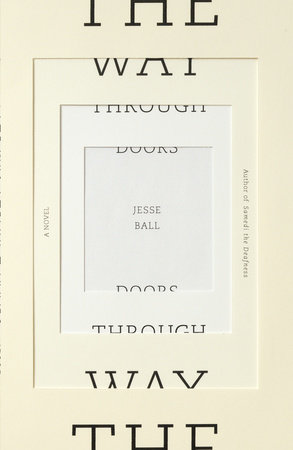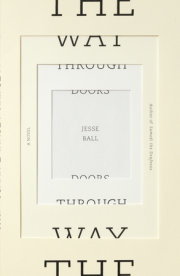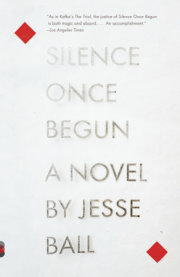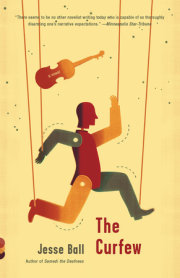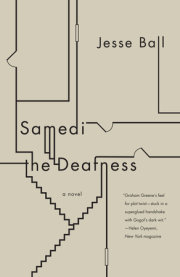—Young man, let me look at you.
The room was broad, and lit from behind by massive windows that lined the dark mahogany-paneled wall. Light came through in a vague haze, sifted just beyond the glass by the leaves of the oaks from the street. A large man, my uncle, came around the desk towards me.
I, smiling, nodding, trying to look agreeable. My uncle fatter than he had been. But happy. Fat and happy. That’s the way. An important man in the governing of the city, my uncle had always been far too busy to bother with such as me.
—My boy, you seem well. Not too long, coming down here on the train? There was an accident just yesterday. Someone got pushed.
The way he said it made it sound like the city was a sort of theatrical production.
—Not long, I said quietly. I had my book.
I held up a book. It was a book of letters that desperate Russian poets had sent to an old German poet and he to them during a summer near the beginning of the century. My uncle did not look down at the book, but came around it and slapped me on the back.
—Good, good, he said. (An embrace.)
—You’ve had your hair cut, haven’t you? he asked. Cut with a straight razor, looks like.
—Yes, I said, just now. I do it myself, a couple times a year.
—You use a mirror? he asked.
—No, I said, just a razor and a comb. In fact, I close my eyes.
—Not bad, he said. It’s the old way, isn’t it? Way they used to do it . . . I’d like to see that. Tell me next time, and I’ll send the car.
He gave me another pat, then unhanded me, went back around the desk, and sat down with the air of a man who has often sat down in the presence of others who remain standing.
—I have given your situation some thought, Selah. I understand there was this business in C., and I know it distracted you for a while, but god damn it, man, you’ve got to get yourself together. These scraps of paper . . .
He held up several of my pamphlets. I sat up straight.
—It just won’t do you any good. No conceivable good.
—I . . .
—Enough of that, he said. I have conferred with some old friends and I am going to install you in a position of which I feel you are certainly capable. There is a man I know, Levkin. He’s an odd man, but trustworthy. I think you can gain much from his acquaintance.
He pressed a button behind his desk, and a door on the far side of the room opened. A man came out. He had evidently been waiting there some time, but he gave no sign of it. Nodding to my uncle, he immediately addressed me.
—Selah Morse?
I nodded. A strange-looking man. He was the sort you could never recall anything about afterwards. Featureless. Not that he didn’t have features. He was of a certain height, of a certain weight, etc., but they didn’t add up to anything. He was more of an average weight, an average height. If he left the room, who would remember him?
—This way, please.
He looked at me as I stood there, book in hand.
My uncle nodded.
—I think you’ll find the work pleasant.
Come see me in a week or so. We’ll lunch together. I know a place. . . .
But already I was following the featureless man through the paneling and down a set of stairs.
At the bottom of the stairs there was a passage that let out onto the street. I tried to place it in my memory in case I ever needed to get up to my uncle’s office on the quick. In my head I imagined an enormous house, a mansion I had visited once as a boy. I walked in the front door, along the central hallway. On the right was a room made expressly for telephoning. I entered it, pulled tight the door. Beside the telephone on the nightstand, I placed the idea of this secret entranceway to my uncle’s office. Quietly then I exit first the telephone-room, then the mansion, shutting carefully the doors.
—Call me Levkin, the man said shortly.
I nodded. There was no need to say my name.
I followed Levkin down the block. He had a rapid way of walking with hardly any wasted motion. He turned several times, finally coming to a sort of pocket-park. In the center, a building. We crossed the park, mounted the steps, and entered, he turning in the lock a sort of monkey-faced key.
Within there was a large room. A desk stood opposite the door. On it a girl lay sleeping. She was quite slender, and expensively dressed. She gave one the impression of a cat, insomuch as were one to wake her it seemed she would only stalk off to some other equally unlikely napping place, there to resume her slumber.
I looked at Levkin. He had his finger over his lips. Softly he said:
—That’s Rita, the message-girl.
—Messages for what? I whispered.
—The Seventh Ministry. Municipal Inspection.
He passed on through a left-hand door into a long sort of sitting room. There were tables, chairs, and sofas, as well as a large armoire. He opened it. Inside were a great number of identical suits in various sizes. Identical to the suit he himself was wearing. It was an elegant suit, obviously costly, but very quiet.
—Size? he said.
I reached past him and took the appropriate suit.
—Your office is this way, he said.
We exited the sitting room and proceeded back past Rita, who was now awake and watching us with one of two eyes. I said nothing; she said nothing.
—In here, said Levkin.
Through the right-hand door we went. A hallway led to the back of the house. There was a ladder on one side and a stair on the other. Levkin climbed up the ladder. I followed. At the top, a landing and a door. He opened the door.
—Your office. On the desk, a letter in explanation. Rita may or may not be up soon with your tea.
Levkin did a sort of half bow, and vanished back through the door and down the ladder, leaving me to survey my new premises. It was a fine room. A very long window ran much of the way along the wall, giving a view out onto the park. A dog was chasing another dog, which was chasing the first dog unsuccessfully. I felt that this meant something. I wrote it down on a pad of paper.
Dog chasing dog itself chasing dog, but not fast enough.
I illustrated the note, took a tack, and pinned it to the wall beside my desk. As I did this, Rita entered and leaned against the wall.
—Dressing up the place? she asked.
—Is that my tea? I asked.
—It can be.
She crossed the room and set the tea down on a small table by the window. With a sigh she threw herself down into a large leather chair and sat watching me.
I shook my head. I picked the suit up, went into the bathroom, and changed into it, slowly and carefully. The experience was enormously pleasing. Never had I been in possession of such a fine suit. It fit perfectly. Pants, shirt, vest. There was even a pocket watch.
Rita entered the room.
—Not bad, she said, and held the suit coat up for me.
I slid it on.
—Milk and sugar, I said. Or, just honey. If you’re going to do something, you might as well . . .
—I’ll write that down somewhere and lose it, she said. The suit fits. Not bad. I imagine you don’t know a thing about what goes on here, do you?
—I know enough, I retorted.
—We’ll see, she said. If you know anything at all, then why do we keep all our clocks three hours ahead?
We went out into the main room. Sure enough, the clock was three hours ahead.
—Well, that’s obvious enough, I said. But I’m busy. Don’t you have something to do?
—Try figuring out why you have . . .
She reached into the sleeve of my suit and pulled a long white handkerchief out of a secret pocket. It was monogrammed: S. M.
—. . . secret pockets in your clothing. Tell me that, buster.
She spun around and left out a different door, one on the far side of the room.
Only after she was gone did I wonder, how had she climbed the ladder with a cup of tea on a saucer? Evidently there was more to Rita than met the eye, though what met the eye was just fine.
Turning back to the desk I found an envelope. Within there was a letter, two days old.
Seventh Ministry 21 July xxxx
Mr. Selah Morse,
Imagine that you are being written to from a place no larger than a gourd. In this gourd, furthermore, the necessary supplies for writing letters do not exist. Therefore, we make do with other mediums. Or perhaps this business of the gourd is a lie, a simple way of beginning a letter that I had hoped I would never have to write. The simple matter is this—up until now there has always been one Municipal Inspector in the city. For there to be two, well, I simply was not prepared for the circumstance to arise. Yet here you are.
I have it on good authority from Rita, the message-girl, that you cannot be trusted with any task, and that we should despair of your ever becoming a useful member of our little cadre. However, at the time of her saying this, Rita was operating under the clever assumption that you were only an idea and not an actual person. The contrary, rather, is the case. You are an actual person, and the work that you have to accomplish here is merely an idea.
Do you understand? We inspect things. We go about the city and occasionally stir ourselves to inspect virtually anything we choose. Our authority is both unlimited and nonexistent. It operates on a case-by-case basis. On a given day I might have the power to shut down a dam. The next I cannot cause a street vendor to move from off a corner. Vaguer and vaguer! I’m sure you understand now. After all, you were recommended to us as a sly young man. This you had best prove.
Senior Inspector, Seventh Ministry
Mars Levkin
I set the paper down. By the window I found my tea. It was quite cold. In fact, it looked like someone had been ashing a cigarette in it.
—That wasn’t for you to drink, said Rita, opening the door again.
She had a tray this time. On the tray was another envelope, and a cup of tea. She brought it over and set it down gently.
—I’m Rita the message-girl, she said.
—I’ve been told that, I replied.
She adjusted the hem of her skirt.
—Any messages to send? she said.
—Could you tell Levkin that—
—No! she said. Only written messages. What sort of message girl do you think I am?
She stalked off, leaving me with the tea and letter.
I took a sip of the tea. Irish Breakfast, with just the right amount of milk and sugar. Thank you, Rita. I opened the letter.
Seventh Ministry 21
July xxxx
M.I. Selah Morse,
I do hope you’re settling in. Things have been dreadfully strange around here ever since Maude ran away (the gray tabby). I think you are quite handsome and pleasant to talk to, and you mustn’t get the wrong idea about me. I am excited to see if you can do the work, and if you like it. Also, I had a cousin named Selah who died when he was very young. He died right after he learned to read. The doctor said some people aren’t meant to read. No one knows if he was joking or not, but we have to assume so. Was it a funny joke? I have never been in a position to tell. Anyway, good-bye for now,
Rita Liszt, M.G.
Seventh Ministry
I closed the letter and smiled to myself. On an ordinary day, I would be reading in the park or working on one of my pamphlets in my cramped apartment. Was it true? Had I really come up in the world? I inspected my clothing for secret pockets and found several more, including a rather clever one that went all the way down the pant leg, starting beneath a false belt loop. Or, I suppose, the belt loop was a belt loop truthfully. But it also had this other business of being the start of a secret pocket.
HOWEVER, the true business began later, and about that we will now speak.
Several months, perhaps six or nine, had passed since I had begun work as an inspector. I was quite used to my schedule and to my responsibilities. It was late in the day, when afternoon has begun quite visibly to crumple around the edges and one can smell rather than sense that evening will soon be upon us. Quite the opposite is true in winter, when one sees night approaching from afar on spindly noiseless legs. But now it was the spring, and I was heading towards a noodle shop happily situated between a sort of pretend-dadaist gallery and an old movie theater named the Grand Corazon. Whenever I was in that neighborhood I made a point of stopping by the noodle shop.
As I walked, a girl came out of a doorway ahead of me and paused in the street. She was very happy, perhaps as happy as a person could be; one could tell this at a glance. She looked up at the second-story window. It was closed. Presumably she had just come from the apartment to which it belonged. The girl was quite fine-looking, with bare shoulders and a beauty that I have always ascribed to the Han dynasty of ancient China. Not that she was Chinese. No, I didn’t know what she was, Slavic maybe, and elegant.
Out of nowhere, a taxi came speeding. There was a great honking of horns, a shouting. The girl made as though to jump back onto the curb, but instead went the other way, out into the street. With a dreadful thud, the braking taxi smashed full into the girl, sending her flying up into the air to land flat on the pavement some twenty feet away. The whole thing was rather like a geometry problem. Except that one could see immediately how truly injured the girl was, and one oughtn’t to say such things or even think them at such times.
I dropped the brown paper parcel I was carrying and ran to where she lay. One isn’t supposed to lift or move people who have been struck by dynamically heavy and fast-moving objects; however, I couldn’t help but lift the girl off the street. She was completely unconscious. All her gladness had paused a moment.
—Driver! I shouted.
Copyright © 2009 by Jesse Ball. All rights reserved. No part of this excerpt may be reproduced or reprinted without permission in writing from the publisher.

